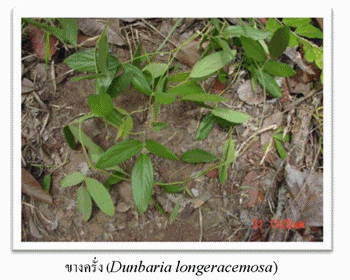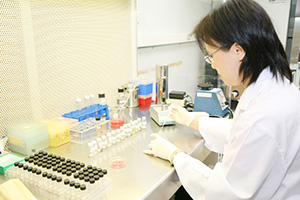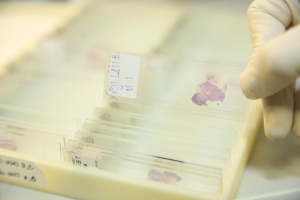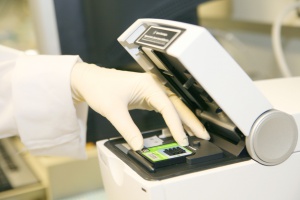Integrated Research Programs
Integrated research programs have been organized to promote the pooling of resource persons, facilities, and funding among selected national and international institutes, with the aim of solving problems of mutual interest and importance.
The institute is linked to a number of major scientific and research institutions in the country, and will acts as a catalyst to facilitate and coordinate collaboration at both national and international levels.
CRI has initiated 3 major research programs i.e. natural products for drug development, malaria, and cancer, to link and integrate research activities undertaken in the Institute’s laboratories in integrated programs designed to provide an effective approach to problem solving.
Research Focus
Natural Products for Drug Development
Drug discovery from natural products can address the interdependent issues of biodiversity conservation, economic growth, and human health. Biodiversity conservation and sustainable economic development is most important in non-industrialized countries that are short of cash but rich in natural resources.
It is a matter of paramount importance to public health and indeed to human life that urgent action is taken to prevent further diminution of actual and potential availability of medicinal and biological agents.
Our country, Thailand, as a tropical country, has long enjoyed the luxury of an innumerable variety of tropical plants. In this regard, the Thais have a long traditional of folklore medicine, utilizing alleged medicinal herbs and plants. However, most of these “claimed” curative properties have neither been properly investigated nor scientifically proved and it is not uncommon to find a herb cited as a cure for “all” ailments. It is apparent that research in this area is urgently needed to explore the potential of these natural products before opportunities become forever lost through advancing deforestation and other adverse environmental impacts.
The process that leads from the plant to a pharmacologically active, pure constituent requires a close multidisciplinary collaboration of botanists, biologists, pharmacognosists, chemists, pharmacologists and toxicologists This program on natural products for drug development will supplement our Integrated research programs on malaria and cancer and link collaboration among these scientist for the research on Thai medicinal plants.
Malaria
Malaria has been responsible for much human suffering and misery accompanying the process of social and economic development. Some 270 million people are infected with malaria as estimated by WHO. More than 2,000 million people in some 100 countries now live in areas where there is a definite risk of falling sick from malaria. Over the last ten years, the malaria situation has been worsening in many parts of the world. The need to find new anti-malarials is pressing due to the discovery of the resistance of the human malarial parasite, Plasmodium falciparum, to the presently available common antimalarial drugs.
Treatment has thus become both less effective and much more expensive. The problem is further aggravated by the resistance of vector anopheline mosquitoes to the most effective and least toxic insecticides which were used to kill them. Today, not only there are strains of P. falciparum resistant to chloroquine but also to other drugs including amodiaquine, sulphadoxine-pyrimethamine, quinine and mefloquinie. It has been suggested that if the present trend continues, the affluent countries will soon arrive at the end of their drug repertoire. To tackle the malaria problem, a combined interdisciplinary approach is highly desirable for successful results. Our Institute is well suited to serve these needs. The chemistry laboratories have successfully synthesized many potential antimalarials as well as procured many plant extracts and isolated natural products for in vitro and in vivo testing routinely carried out in the biomedical laboratories.
Other aspects of the Institute’s malaria research include:
a) Development of new methods for detection of malaria. This project is undertaken by the Laboratories of Pharmacology and Environmental Toxicology in collaboration with the University of Texas M.D. Anderson Cancer Center.
b) The study of pathophysiology of malarial infection, mechanisms of drug resistance and adverse drug effects. This study is carried out in the Laboratory of Pharmacology.
Cancer
The third Integrated Research program is the cancer research program. Cancer is not a uniform disease, but is a group of diseases which share common features such as abnormal cell growth and proliferation, and appears to begin with a genetic defect in a single cell. These abnormalities results from a number of biochemical and pathological processes. Carcinogenesis is therefore an exceedingly complex process involving multistage.
The research program in cancer encompasses the study of the mechanisms of carcinogenesis, modifiers and risk factors in carcinogenesis, identification of specific tumor markers, development of monoclonal antibody for early detection of certain tumors, and screening of Thai medicinal plants for anti-cancer and chemopreventive properties.
The CRI cancer research program focuses on the type of cancers prevalent in Thailand and in this geographical region, such as liver cancer, esophageal cancer and cholangiocarcinoma, the etiology of which may be related to diet, life-style and other pathological conditions.
Basic cancer research is carried out in the Laboratories of Chemical Carcinogenesis, Environmental Toxicology, Immunology and Biochemistry. Screening of natural products for anticancer and chemoprevention activities is conducted by the Laboratories of Natural Products, Medicinal Chemistry, Chemical Carcinogenesis and Environmental Toxicology.



